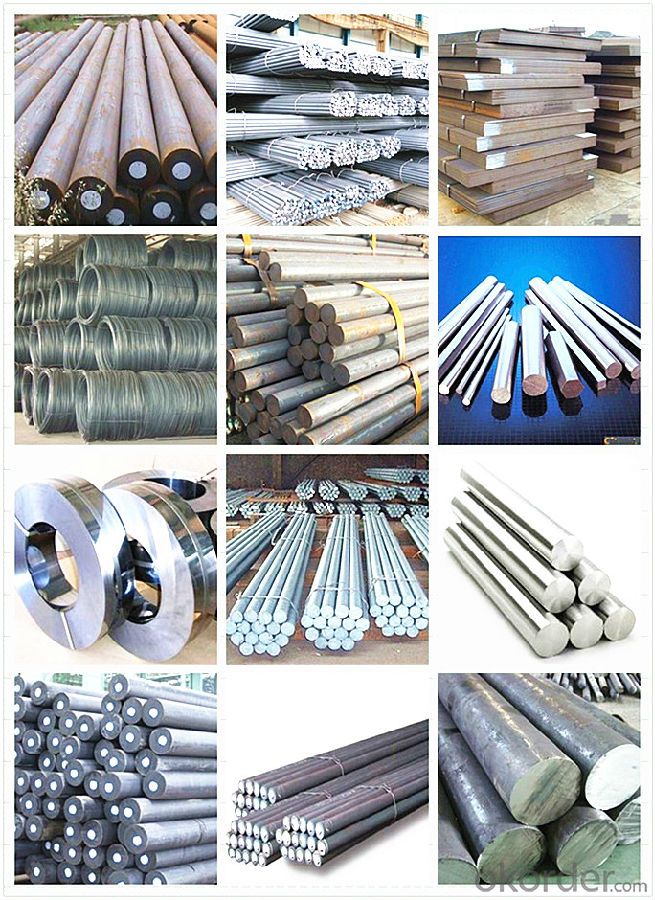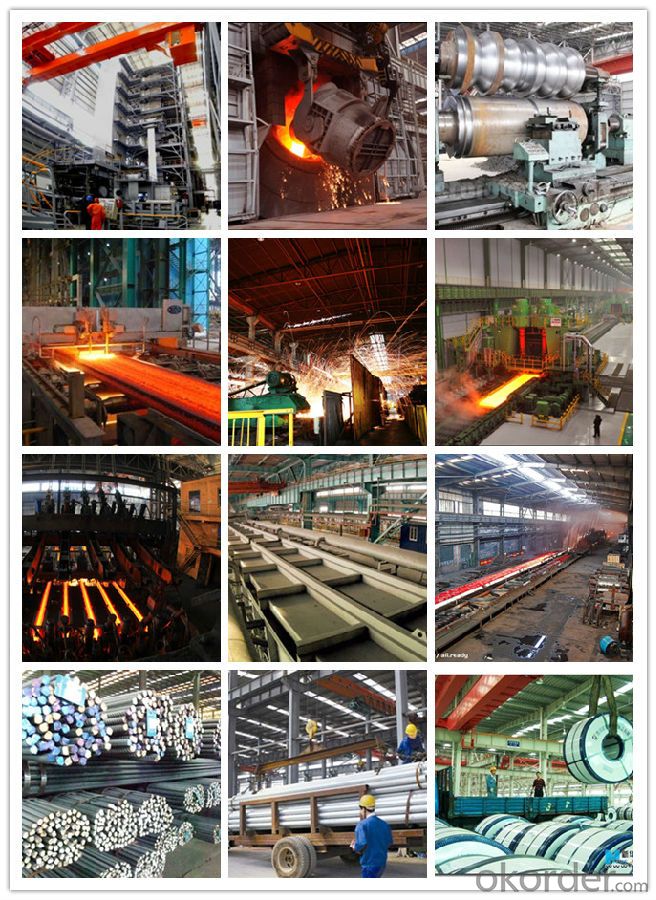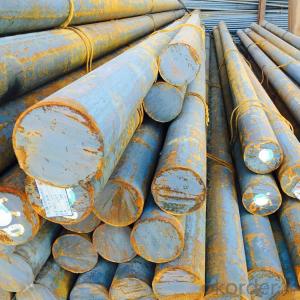Special Steel S45C Carbon Structural Steel
- Loading Port:
- China main port
- Payment Terms:
- TT OR LC
- Min Order Qty:
- 30 m.t.
- Supply Capability:
- 10000 m.t./month
OKorder Service Pledge
OKorder Financial Service
You Might Also Like
Item specifice
Product Information
1. Grade Comparison
GB | ASTM | JIS | DIN |
45# | SAE1045 | S45C | C45 |
2. Chemical Composition
Grade | C | Si | Mn | P | S | Cr | Cu | Ni |
45# | 0.42-0.50 | 0.17-0.37 | 0.50-0.80 | ≤0.035 | ≤0.035 | ≤0.25 | ≤0.25 | ≤0.30 |
S45C | 0.42-0.48 | 0.15-0.35 | 0.60-0.90 | ≤0.030 | ≤0.035 | - | ≤0.30 | ≤0.20 |
C45 | 0.42-0.50 | ≤0.40 | 0.50-0.80 | ≤0.045 | ≤0.045 | ≤0.40 | - | ≤0.40 |
1045 | 0.43-0.50 | 0.15-0.35 | 0.60-0.90 | ≤0.040 | ≤0.050 | - | - | - |
3. Brief Introduction:
Dimension | 13-350mm |
Length | 2-13m or as per your request |
Delivery condition | Hot rolled |
Heat Treatment | Normalizing, Annealing, Quenching |
Packing | Standard seaworthy packing or according to your requirements |
4. Application:
1) Can be used in many fields such as building, automobile, shipbuilding,
petrochemical, machinery, medicine, food, electric power, energy, space and decoration, etc.
2) Can be made into mould template, mortise pin, column
3) This kind of steel have good mechanical property, is widely used in structural parts
4) which may support stress alternation, especially made into some connecting
rods, bolts, wheel gear...
5) This kind of steel is the most common blanks and materials of shaft part
Product Show

Workshop Show

Shipping
1. FedEx/DHL/UPS/TNT for samples, Door-to-Door;
2. By Air or by Sea for batch goods, for FCL; Airport/ Port receiving;
3. Customers specifying freight forwarders or negotiable shipping methods!
Delivery Time: 3-7 days for samples; 5-25 days for batch goods.
Payment Terms
1.Payment: T/T, L/C, Western Union, MoneyGram,PayPal; 30% deposits; 70% balance before delivery.
2.MOQ: 1pcs
3.Warranty : 3 years
4.Package Informations: 1) EXPORT, In 20 feet (GW 25 ton) or 40 feet Container (GW 25 ton)
2)as customer's requirement
Why choose us?
(1) The leading exporter in China special steel industry.
(2) Large stocks for various sizes, fast delivery date.
(3) Good business relationship with China famous factories.
(4) More than 7 years steel exporting experience.
(5) Good after-sales service guarantee.
- Q:What are the requirements for special steel used in automotive parts manufacturing?
- To ensure superior performance, safety, and durability of vehicles, specific and crucial requirements must be met for the special steel used in automotive parts manufacturing. Here, we outline some key requirements for this special steel: 1. The special steel used in automotive parts must possess high strength and hardness to withstand the extreme stresses and loads experienced by automotive components. This ensures that the parts can endure heavy usage, resist deformation, and avoid failure under demanding conditions. 2. In addition to strength and hardness, the special steel must also exhibit good ductility and toughness. Ductility allows for the formation and shaping of intricate automotive parts, while toughness ensures that the parts can absorb energy and resist fracture or cracking upon impact. 3. Automotive parts are constantly exposed to various environmental conditions, such as moisture, humidity, and road salts. Therefore, the special steel used in these parts must exhibit excellent corrosion resistance to prevent rust and deterioration, thereby increasing the longevity and reliability of the parts. 4. As automotive parts are often assembled through welding processes, it is essential for the special steel to have good weldability. This allows for efficient and secure joining of different components, ensuring structural integrity and minimizing the risk of weld defects. 5. The special steel used in automotive parts manufacturing should have sufficient heat resistance to withstand high temperatures generated during engine operation, friction, or other thermal processes. This ensures that the steel maintains its mechanical properties even under extreme heat conditions, preventing premature failure or deformation. 6. Automotive parts are subjected to repeated loading and unloading cycles, which can lead to fatigue failure if the steel does not have adequate fatigue strength. Therefore, the special steel should possess high fatigue strength to withstand cyclic loading and resist fatigue cracks, enhancing the durability and reliability of the parts. 7. Automotive parts need to maintain their shape and dimensions over time to ensure proper fit and functionality. Therefore, the special steel used in manufacturing should exhibit dimensional stability, minimizing any warping or distortion during heat treatment or operational conditions. 8. While meeting all these requirements, the special steel should also be cost-effective for automotive parts manufacturing. This means that the steel should be reasonably priced, readily available, and offer a good balance between cost and performance. Meeting these requirements is crucial for manufacturers to produce high-quality automotive parts that meet industry standards, perform optimally, and contribute to the overall safety and performance of vehicles.
- Q:Can special steel be used for medical implants?
- Yes, special steel can be used for medical implants.
- Q:What are the requirements for special steel used in high-strength applications?
- Special steel used in high-strength applications typically has specific requirements to ensure its performance and durability. These requirements include: 1. High tensile strength: Special steel used in high-strength applications must have a high tensile strength to withstand heavy loads and resist deformation. This allows it to handle greater stresses without failure. 2. Excellent toughness: The steel should possess excellent toughness, which refers to its ability to absorb energy and resist fracture. This is crucial in high-strength applications as it prevents sudden and catastrophic failure under impact or dynamic loading conditions. 3. Superior hardness: High-strength steel needs to have a high level of hardness to resist wear, abrasion, and indentation. This ensures that the material maintains its structural integrity and performance even under extreme conditions. 4. Good ductility: While high tensile strength is essential, the steel should also possess good ductility, which allows it to undergo plastic deformation without fracturing. This property is vital in applications where the steel needs to be formed or shaped during manufacturing processes. 5. Resistance to corrosion: Special steel used in high-strength applications should have excellent corrosion resistance to prevent degradation caused by exposure to moisture, chemicals, or harsh environments. This ensures its longevity and reliability in various conditions. 6. Heat resistance: Some high-strength applications involve exposure to high temperatures, so the steel should have good heat resistance to maintain its mechanical properties and structural stability under elevated temperatures. 7. Controlled alloying elements: Special steel used in high-strength applications often contains specific alloying elements such as chromium, molybdenum, nickel, or vanadium. These elements are added to improve the steel's strength, toughness, hardness, and other desired properties. 8. Precise composition and microstructure: The steel should have a well-controlled composition and microstructure to ensure consistent and predictable mechanical properties. This can be achieved through precise manufacturing processes, such as controlled cooling rates or heat treatments. Meeting these requirements ensures that special steel used in high-strength applications can withstand the demanding conditions it is subjected to, providing reliable performance, longevity, and safety.
- Q:What are the main advantages of using special steel in the automotive industry?
- Special steel offers several advantages in the automotive industry. Firstly, it provides enhanced strength and durability, ensuring the safety and reliability of vehicles. Secondly, special steel is lightweight, contributing to fuel efficiency and reducing carbon emissions. Additionally, it offers excellent formability and weldability, allowing for complex and intricate designs. Lastly, special steel possesses high corrosion resistance, extending the lifespan of automotive components and reducing maintenance costs. Overall, the use of special steel in the automotive industry enhances performance, efficiency, safety, and longevity.
- Q:How is special steel heat treated?
- Special steel is heat treated using a combination of heating and cooling processes to improve its strength, hardness, and other desired properties. This typically involves heating the steel to a specific temperature, known as the austenitizing temperature, followed by rapid cooling, known as quenching, to transform the steel's microstructure. This is then followed by tempering, where the steel is reheated to a lower temperature to relieve internal stresses and further enhance its mechanical properties. The specific heat treatment process and parameters vary depending on the type of special steel and the desired final properties.
- Q:What are the different methods of surface grinding for special steel?
- There are several methods of surface grinding for special steel, including peripheral grinding, creep feed grinding, and multi-axis grinding.
- Q:What are the specific requirements for special steel used in the marine shafting industry?
- The marine shafting industry has specific requirements for special steel, which are as follows: 1. Corrosion Resistance: The steel used in marine shafting must possess a high resistance to corrosion, as it is exposed to harsh marine conditions. It should be able to withstand saltwater, humidity, and other corrosive elements without deteriorating. 2. Strength and Toughness: Marine shafting steel should have high strength and toughness to withstand the heavy loads and vibrations experienced in marine operations. It should be able to handle continuous stress and dynamic loads without failing or deforming. 3. Fatigue Resistance: The steel used in marine shafting should have excellent fatigue resistance to endure the cyclical loading during operation. It should be able to withstand millions of load cycles without developing cracks or fractures. 4. Dimensional Stability: Special steel used in marine shafting must maintain dimensional stability to ensure accurate alignment and fit within the machinery. It should have minimal dimensional changes under varying temperature and humidity conditions to preserve the integrity of the shaft system. 5. Machinability: The steel used in marine shafting must be easily machinable to create intricate shapes, such as propeller shafts and couplings. This allows for efficient manufacturing and maintenance of the shafting components. 6. Non-Magnetic Properties: Special steel used in marine shafting should have low magnetic permeability to avoid interfering with sensitive navigation and communication equipment. Non-magnetic properties minimize the risk of compass errors and electromagnetic interference. 7. Certification and Compliance: The steel used in marine shafting should meet specific industry standards and certifications, such as those established by classification societies like the American Bureau of Shipping (ABS) or the International Association of Classification Societies (IACS). These certifications ensure the steel's quality, performance, and compliance with safety regulations. By meeting these specific requirements, the special steel used in marine shafting guarantees reliable performance, durability, and safety in marine applications.
- Q:How is special steel tested for quality and performance?
- Special steel is tested for quality and performance using a variety of methods, including visual inspection, mechanical testing, and chemical analysis. Visual inspection involves examining the steel for any surface defects or abnormalities. Mechanical testing involves subjecting the steel to various physical stress tests to assess its strength, hardness, toughness, and other mechanical properties. Chemical analysis is performed to check the composition of the steel, ensuring it meets the required standards and specifications. These comprehensive testing procedures are essential to guarantee the quality and performance of special steel in various applications.
- Q:What are the different test methods used to evaluate special steel?
- There are several test methods used to evaluate special steel, including mechanical tests such as tensile strength, hardness, impact toughness, and fatigue strength testing. Chemical analysis is also essential to determine the composition of the steel, while microstructure examination allows for the assessment of grain size, inclusion content, and overall quality. Additionally, non-destructive testing methods like ultrasonic testing, magnetic particle inspection, and dye penetrant testing are employed to detect any surface or subsurface defects in the steel. These various test methods provide comprehensive information about the mechanical properties, chemical composition, microstructure, and overall quality of special steel.
- Q:What are the different nuclear grades of special steel?
- There are several nuclear grades of special steel, including but not limited to A508 Class 1, A533 Type B Class 1, A533 Type B Class 2, A508 Class 2, A533 Type C Class 1, A508 Class 3, and A533 Type C Class 2. These grades are specifically designed to meet the stringent requirements of nuclear power plant applications, ensuring high strength, resistance to radiation damage, and excellent fracture toughness.
1. Manufacturer Overview |
|
|---|---|
| Location | |
| Year Established | |
| Annual Output Value | |
| Main Markets | |
| Company Certifications | |
2. Manufacturer Certificates |
|
|---|---|
| a) Certification Name | |
| Range | |
| Reference | |
| Validity Period | |
3. Manufacturer Capability |
|
|---|---|
| a)Trade Capacity | |
| Nearest Port | |
| Export Percentage | |
| No.of Employees in Trade Department | |
| Language Spoken: | |
| b)Factory Information | |
| Factory Size: | |
| No. of Production Lines | |
| Contract Manufacturing | |
| Product Price Range | |
Send your message to us
Special Steel S45C Carbon Structural Steel
- Loading Port:
- China main port
- Payment Terms:
- TT OR LC
- Min Order Qty:
- 30 m.t.
- Supply Capability:
- 10000 m.t./month
OKorder Service Pledge
OKorder Financial Service
Similar products
New products
Hot products
Hot Searches
Related keywords






























